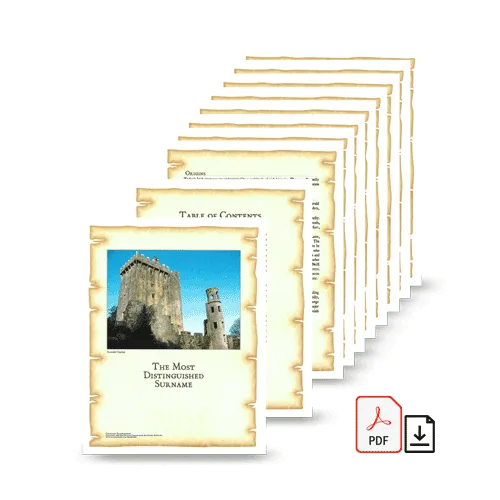| ![Show Contents]() Keyworth Surname History Keyworth Surname History
- Origins Available:
England
Etymology of KeyworthWhat does the name Keyworth mean? Keyworth is a name of ancient Anglo-Saxon origin and comes from the family once having lived in the parish of Keyworth located near the county of Nottinghamshire. Early Origins of the Keyworth familyThe surname Keyworth was first found in Nottinghamshire, where evidence suggests they held a family seat before the Norman Conquest. Early History of the Keyworth familyThis web page shows only a small excerpt of our Keyworth research. Another 81 words (6 lines of text) covering the years 1086, 1590, 1782, 1786 and 1852 are included under the topic Early Keyworth History in all our PDF Extended History products and printed products wherever possible. Keyworth Spelling VariationsSound was what guided spelling in the essentially pre-literate Middle Ages, so one person's name was often recorded under several variations during a single lifetime. Also, before the advent of the printing press and the first dictionaries, the English language was not standardized. Therefore, spelling variations were common, even among the names of the most literate people. Known variations of the Keyworth family name include Keyworth, Keeworth, Keiworth, Keworth, Kayworth and many more. Early Notables of the Keyworth familyDistinguished members of the family include - Thomas Keyworth of the city of Nottingham, 1782-1852, minister and writer
| Keyworth migration to the United States | + |
For political, religious, and economic reasons, thousands of English families boarded ships for Ireland, Canada, the America colonies, and many of smaller tropical colonies in the hope of finding better lives abroad. Although the passage on the cramped, dank ships caused many to arrive in the New World diseased and starving, those families that survived the trip often went on to make valuable contributions to those new societies to which they arrived. Early immigrants bearing the Keyworth surname or a spelling variation of the name include:
Keyworth Settlers in United States in the 19th Century- Thomas Keyworth, who arrived in St Clair County, Illinois in 1884 1
| Keyworth migration to Canada | + |
Some of the first settlers of this family name were: Keyworth Settlers in Canada in the 19th Century- Eliza Keyworth, who was recorded in Ontario in 1834
- John and Richard Keyworth were living in Bruce County, Ontario in 1867
| Keyworth migration to Australia | + |
Emigration to Australia followed the First Fleets of convicts, tradespeople and early settlers. Early immigrants include: Keyworth Settlers in Australia in the 19th Century- Thomas Keyworth, aged 22, a bedsteadmaker, who arrived in South Australia in 1849 aboard the ship "Ascendant" 2
- Thomas Keyworth, who arrived in Adelaide, Australia aboard the ship "Ascendant" in 1849 2
| Contemporary Notables of the name Keyworth (post 1700) | + |
- Dr. George Albert "G.A." Keyworth II (1939-2017), American physicist; presidential Science Advisor 1981–1985
- Donald A Keyworth, American chemical company executive
- Maurice R. Keyworth (1886-1935), American Republican politician, Elected Michigan superintendent of public instruction 1935, but died before taking office 3
- Leonard James Keyworth (1893-1915), English recipient of the Victoria Cross for his bravery during World War I
- Mr. Henry Keyworth, British sheriff, held the joint position of Sheriff of Nottingham, England from 1783 to 1784
- Filby, P. William, Meyer, Mary K., Passenger and immigration lists index : a guide to published arrival records of about 500,000 passengers who came to the United States and Canada in the seventeenth, eighteenth, and nineteenth centuries. 1982-1985 Cumulated Supplements in Four Volumes Detroit, Mich. : Gale Research Co., 1985, Print (ISBN 0-8103-1795-8)
- State Records of South Australia. (Retrieved 2010, November 5) The ASCENDANT 1849. Retrieved from http://www.slsa.sa.gov.au/BSA/1849Ascendant.htm
- The Political Graveyard: Alphabetical Name Index. (Retrieved 2015, October 26) . Retrieved from http://politicalgraveyard.com/alpha/index.html
 |

